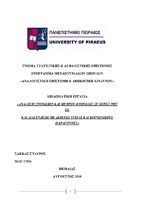Ανάλυση στοιχείων και μέτρων φτώχειας σε χώρες της ΕΕ και διασύνδεση με δείκτες υγείας και κοινωνικούς παράγοντες
Analysis of deprivation data and measures and connection to social factors and health related issues in EU

Προβολή/
Λέξεις κλειδιά
Δείκτες υγείας ; Κοινωνικοί παράγοντες ; Στοιχεία και μέτρα φτώχειας ; Ευρωπαϊκή ΈνωσηΠερίληψη
Στην καθημερινή ζωή η "φτώχεια" ορίζεται ως η αδυναμία απόκτησης ενός αξιοπρεπούς τρόπου ζωής. Έτσι, η έλλειψη ενός στοιχειώδους επιπέδου διατροφής, ένδυσης και στέγασης είναι ένα προφανές μέτρο.
Ωστόσο, το τι θεωρείται επαρκές και τι θεωρείται αναγκαίο είναι διαφορετικό ανάλογα με την εποχή και την κοινωνία και υπό αυτή την έννοια η φτώχεια είναι σχετική. Πιο συγκεκριμένα, η φτώχεια ορίζεται σε σχέση με το μέσο (median) εισόδημα της χώρας.
Έτσι, το όριο της φτώχειας ορίζεται στο 60% του μέσου εισοδήματος. Με άλλα λόγια, οι άνθρωποι που έχουν εισόδημα λιγότερο από το 60% του μέσου εισοδήματος της χώρας τους, κινδυνεύουν να ανήκουν στην κατηγορία των φτωχών.
Σύμφωνα με στοιχεία της ευρωπαϊκής ένωσης, σχεδόν 84 εκατομμύρια Ευρωπαίοι ζουν στα όρια της φτώχειας, γεγονός που συνεπάγεται σωρεία προβλημάτων για τους ίδιους αλλά και για το κοινωνικό σύνολο.
Η φτώχεια δημιουργεί στους ανθρώπους συναισθήματα ανασφάλειας και επιβλαβών καταστάσεων όσον αφορά την υγεία, καθώς δυσκολεύονται να καλύψουν βασικές βιοτικές ανάγκες, ενώ παράλληλα είναι αναγκασμένοι να ακολουθούν συγκεκριμένο τρόπο ζωής, ο οποίος συνήθως οδηγεί σε αρνητικά φαινόμενα.
Σκοπός και στόχος της παρούσας εργασίας είναι να αναδείξει και να αναλύσει τις επιπτώσεις της φτώχειας σε συνάρτηση με τους δείκτες υγείας και τους κοινωνικούς παράγοντες.
Η φτώχεια είναι ένα παγκόσμιο κοινωνικό πρόβλημα που ζητά λύση.
Μέσω και της στατιστικής ανάλυσης των δεδομένων παρατηρήθηκε ότι τα σημαντικότερα ευρήματα έχουν να κάνουν με την ιδιαίτερα μεγάλη διαφορά ανάμεσα στο χαμηλότερο και τον υψηλότερο μέσο εισόδημα στην κάθε χώρα, και παρατηρείται ότι το 50% του πληθυσμού έχει αρνητική κατάσταση υγείας και ένα σημαντικό ποσοστό πάσχει και από κατάθλιψη.
Σκοπός είναι να παρουσιαστούν όσο το δυνατόν περισσότερα στοιχεία και να δοθεί το έναυσμα για την περαιτέρω διερεύνηση αυτού του φαινομένου.


